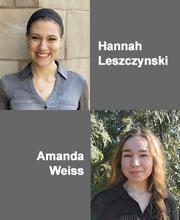Graduate Student Presentations: Hannah Leszczynski and Amanda Weiss

AMERICAN POLITICS & PUBLIC POLICY WORKSHOP
“To Comment or Not to Comment: Interest Group Incentives to Keep Quiet” with Hannah Leszczynski
Abstract: Interest group influence on policy making has long been of interest to scholars. While much of our focus has been on how lobbying in Congress impacts legislation, interest group involvement in the administrative state remains understudied. Specifically, the notice and comment process required by the Administrative Procedure Act relies on participation from outside interests to ensure rulemaking is a democratic process. Additionally, existing research demonstrates that commenting on proposed regulation often leads to policy concessions, yet interest groups regularly decline to participate. This project seeks to explain interest group noninvolvement in the rulemaking process and its downstream effects on policy.
Hannah Leszczynski is a PhD student in the Department of Political Science at Yale University, prior to which she earned a BSE in Chemical Engineering and a BS in Political Science from the University of Michigan.
“Beyond Retraumatization: Toward Trauma-Informed Political Science” with Amanda Weiss
Abstract: Ethics guides for political science instruct researchers to avoid retraumatization of human subjects (e.g., APSA 2022, Fujii 2012). Meanwhile, human subjects research on sensitive topics, including violence and repression, has increased. This paper clarifies what is at stake when we talk about research participant distress and provides recommendations for handling concerns about trauma and retraumatization. It offers a new framework for trauma-informed political science research. This framework reflects the conclusions of empirical literature on the risk of distress in different research settings, as well as critical normative perspectives on consequentialist research ethics. In particular, it identifies two approaches for trauma-informed political science research: one for research in less vulnerable contexts and one for research with contexts that are vulnerable in terms of limited resources, ongoing suffering, and/or geopolitical instability. The framework details best practices informed consent, debriefing, and more within each approach. The paper also addresses the special challenges of political violence research. While the literature suggests that retraumatization as such is rarely a major risk of research, the paper highlights that a narrowly defined concept of retraumatization can lead us to neglect other trauma-informed concerns. Future work, building on the paper, will investigate participant reactions to a survey experiment on political emotions.
Amanda Weiss is a PhD candidate in political science at Yale University, also pursuing an MA in statistics. She works on methodological challenges in the study of American politics and policy. The first strand of her research takes up challenges in observational causal inference, such as statistical power using modern difference-in-difference estimators. The second strand concerns the experimental study of political behavior, with a particular focus on measuring and inducing affective states. She holds a BA and MSW from Columbia University.
This workshop is open to current members of the Yale community only.